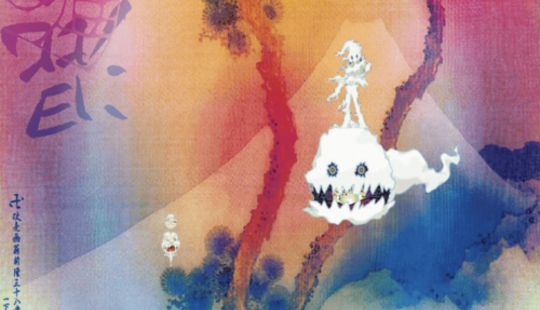Drowned In Sound
90
It should be no surprise how quickly critics harpooned Kanye West’s eighth studio album ye, which has been out for a week now —ravenous to punish him for wearing the wrong hat last month, not to mention the clickbait potential of exiling one of music’s mightiest forces, he was ripe for sacrifice. He always knew they would try to tear him down But the word here is 'try', because if you wander outside the blogosphere, there are millions of passionate fans celebrating the same subversive novelties that have critics brandishing their torches and pitchforks. Now it’s going to be a blast watching them all scramble to reevaluate their agenda to 'cancel' him after he’s delivered his collaboration with Kid Cudi, Kids See Ghosts, ransacking them with just the defibrillating charge of songwriting, production and catharsis they originally pined for in his solo release. This long-awaited collaboration was seemingly conceived in 2016 when West announced he was working with Cudi on an album called Turbo Grafx 16 right after The Life of Pablo’s release, named after a poorly-marketed Japanese game system from the Eighties. It’s the perfect pretext for the aesthetic they hone on Kids See Ghosts: the legacy of joystick-gripping, Manga-devouring, Air Jordan–doodling, introverted millennials who took refuge in Japanese pop culture and went on to dominate American pop culture thereafter, with West and Pharrell as prophets, and Kid Cudi and Frank Ocean as apostles. The sartorial center of the movement was Nigo and his gangster-meets-Kawaii clothing brand A Bathing Ape, and it was at A Bathing Ape’s New York store where Kid Cudi worked and first met Kanye West in 2008. If you lived that subculture, you went lightheaded when you saw Takashi Murakami’s cover design for this record; West’s most inspired artwork commission since 2010’s My Beautiful Dark Twisted Fantasy.
On the album’s opener 'Feel the Love,' Pusha T starts off with a reptilian guest verse, as if to make it sting ten-fold for Drake as he pushes play on the third album to blot out his spotlight in a month (who fired shots at Cudi in addition to Pusha in a single diss track last year). From there, West and Cudi engage in a two-player run-and-gun, Cudi on lead vocals as West screams onomatopoeias in tandem with ballistic drum breaks. The choice of wordless yowling as his entrance is fitting of his current thesis of free thought and creation, going blood-drunk in his battle against culture and politics with backup from his archer and mage.
The 24-minute project is packed with druggy, guitar-based romps, with the space-rock enormity of 'Freeee (Ghost Town, Pt. 2),’ and closer 'Cudi’s Montage’ poignantly building off of a posthumous Kurt Cobain sample. Under all its punk ferocity, however, lies a grander message of mindfulness and mental strength. That’s an immeasurably powerful theme from two musicians both known for bringing vulnerable accounts of severe anxiety and depression to hip hop—especially after 2016, when the two had a brief falling out, and that same winter, checked into inpatient facilities on separate occasions (Cudi into rehab and West into a psychiatric hospital). With suicide rates on a terrifying upswing, their reunion on Kids See Ghosts is the ultimate call to redemption.
You’d expect no less from West, who essentially made self-belief into an instrument, and Cudi, who became a saviour of his generation by opening his debut album with the words “I’ve got some issues that nobody can see.” Intentional or not, even the name of this supergroup lends compassion to the prevalence of mental illness in today's youth, reclaiming it as an advantage, or “superpower,” as West puts it on his own new song ‘Yikes.’ Cudi’s anthemic chants are as simple as ‘I’m so reborn, keep moving forward’ or ‘Stay strong,’ but profound in their vocal conviction and celestial production, both of which he’s realized with new heights of mastery ever since 2016’s lush Passion, Pain & Demon Slayin’. Unexpectedly, Kids See Ghosts finds West at his most poetic in years—I’d like to knot up this review by making some sense of what has become the man’s strangest year to date, with impromptu back-to-back album releases, opioid and plastic surgery confessions, and conservative crusades, but over twinkling chord changes on ‘Reborn,’ he articulates it all better than I could hope to:
I was off the chain, I was often drained
I was off the meds, I was called insane
What an awesome thing, engulfed in shame
I want all the rain, I want all the pain
I want all the smoke, I want all the blame
Cardio audio, let me jog your brain
Caught in the Audy Home, we was all detained
All of you Mario, it’s all a game
From West’s view, most of us are stuck in a simulation, outraged at singular tweets, meeting works of expression with numerical scores, programmed by groupthink. He embraces global ridicule, as long as that’s the cost of truth. Weeks out from the announcement of his philosophy book entitled Break the Simulation, he’s genuinely trying to help us all unlock the same things he has. Resist him all you like, but he’ll still be offering the inspiration at fireside pow wows to anyone who seeks it. Disappointed as you may have been in ye, you’re probably keen to have another listen after hearing Kids See Ghosts. Plus, just watch his permanent smile as he presents his music to the world—you can’t tear him down with your opinion anymore, even if you want to. He’s free.

Mon Jun 11 06:44:00 GMT 2018